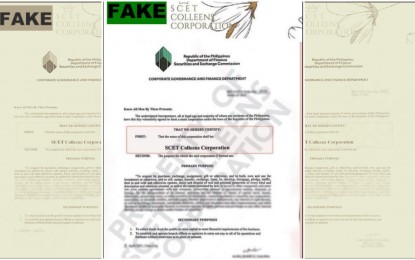
PONZI SCHEME. The Securities and Exchange Commission Cebu extension office releases to the public the purported secondary license as claimed by the beauty and cosmetic firm, SCET Colleens Corporation based in Cebu City. SEC-Cebu officer-in-charge lawyer Alma Marie Estrada-Dalen on Tuesday (Sept. 21, 2021) said the company was flagged for allegedly engaging in an investment scheme without secondary license from the government. (Photo courtesy of Vanessa Almeda)
CEBU CITY – The Securities and Exchange Commission (SEC) has flagged a company based here offering beauty, cosmetics, home and personal care to the public for allegedly engaging in a Ponzi scheme by soliciting investments without a government license and permit.
In a statement on Tuesday, SEC Cebu extension office officer-in-charge, lawyer Alma Marie Estrada-Dalena, identified the company as SCET Colleens Corporation holding office at Unit 2004 Grand Residences on Apitong Street.
Citing SEC Enforcement and Investor Protection Department (EIPD) report, Dalena said the company claimed to have a secondary license but later found in an investigation that the document it was using was allegedly fake.
She said the firm offers a number of investment packages and promos ranging from PHP3,800 to PHP1.08 million promising lucrative passive 5 to 8 percent return on investment per month and other bonuses with little or no risk.
“The public is reminded that any offer or promise of ridiculous rates of return with little or no risk is an indication of a possible Ponzi scheme,” Dalena said.
An investment offer is considered a Ponzi scheme when early investors are paid off their investments from the investments of new investors, and not out of the companies’ profits.
Dalena said these entities are likely to close or shut down once they cannot gather enough investments to fund their schemes due to a lack of new investors.
The SEC conducted the investigation following reports and inquiries of the public on the legal operations of the company which also claims to be a multi-level marketing firm.
The SEC further identified the personalities as incorporators, namely Shara Jane Casao Chavez, Kay Anne Cuizon Leyson, Edith Francisse Villegas Tablante, Earn Sta. Rita Saguindel and Artemio Tarona Ponce Jr.
On the website www.beautynailhairsalons.com, Edith Francisse Villegas Tablante, who claims to be its chief finance officer, takes responsibility “upon the issue facing the company.”
In an advisory issued on Sept. 2, the SEC said the names of those involved will also be reported to the Bureau of Internal Revenue so that the appropriate taxes or penalties will be assessed on them.
“May this serve as a fair warning to the public to always exercise extreme caution before making or placing their monies on entities that offer ‘too good to be true’ investment packages similar to SCET Colleens Corporation especially during this pandemic,” the statement quoted the SEC-EIPD as saying.
Dalena urged the public to always check with SEC through its official website www.sec.gov.ph to determine if the company that an individual is investing with his or her money has a license from the government.
Individuals or corporations that engage in an investment taking also need to have a secondary license, she said, adding that Certificate of Incorporation issued by SEC is not enough to authorize the activity because investment solicitation and investment-taking without a secondary license from the commission is against the law.
Salesmen, brokers, dealers, or agents or anyone who are convincing people to invest in Ponzi scheme, including solicitation and recruitment through the internet, may also face criminal prosecution and face a penalty of a maximum of PHP5 million or 21 years of imprisonment or both based on Sections 28 and 73 of the Securities Regulation Code, Dalena added. (PNA)
